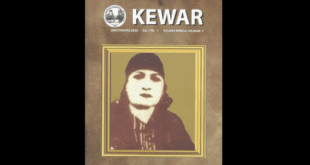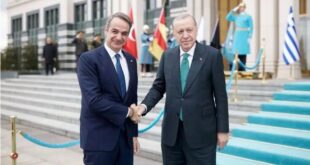Interview: Necat Ayaz
Confederalism ensures more efficient decision-making by clearly defining competencies for each region. It reduces the need for constant negotiations and deadlocks. Unlike the current federal model, where both sides must compromise on nearly all major policies, Confederalism grants Flanders and Wallonia full autonomy over key matters. Cooperation would only be required on a minimal set of common issues, ensuring that consensus is needed only where strictly necessary such as defense.
The Flemish nationalist party N-VA which advocates for confederalism, has come to power in Belgium. This development, seen as a political earthquake in Belgian history has been at the forefront of the national agenda. The federal government’s policy on labor, the economy and military spending have been the main topics of discussion. We discussed these issues with Karl Vanlouve, a prominent Flemish senator of N-VA. Additionaly, we touched on the limits of Flemish internationalism in relation to support for the -Kurdish struggle, particularly the issue of recognizing Rojava Kurdistan.
Your party N-VA has seized the opportunity to govern Belgium with its coalition partner. This is a breakthrough for a Flemish nationalist party now in charge of the entire country. This is a unique situation in the world where an indepentist movement came to power at the federal level. Do you believe you will able be to strike a balance between what is good for Flanders and what is good for Belgium?
Flemish people in Belgium is not minority but majority in Belgium. Catalan, Basques and other people are minorities in their country. As a strong federal government it was crucial for us to take action and address the federal financial deficit. We did this to safeguard the economic prosperity of Flanders and, of course, the stability of our nation as a whole. Considering that Flanders has a higher economic output and lower unemployment compared to the rest of the country, it is vital to protect our Flemish budget and economy. Since, most social security responsibilities lie at the federal level, we must ensure our participation at the federal level to effectively reduce federal expenditures.
We see in Wallonia for the first time Socialist Party is not the biggest party any longer, so the attitudes in Wallonia are slowly changing. We took our responsibility to safeguard the prosperity of Flanders and also prosperity of Wallonia. And our federal policies, will create stability for both regions and thus it is also beneficial for Belgium as a whole.
The main focus of the coalition government programme is to limit the unemployment benefits to two years and reform pension and impliment other strict measures. Additionaly, the military spending will be increased to align with NATO targets. How would define this significant change?

To fix the budgetary crisis at the federal level, social welfare spending cannot be ignored, as it is financially unsustainable. That is why we are indeed reforming pensions, which are a growing government expenditure, especially considering the rapid aging of our population. It is positive development that we are growing older, but this also means that the cost of pensions rapidly increases. That is why we need to take tough measures to make sure that our children are able to have a pension and not work until they are 75-year-old. In Belgium, there are currently 1.8 working people per pensioner, and this number is rapidly declining. By 2070, it is projected to drop to 1.3. For us, thinking about the future of next generations is also a social policy.
The increase in our defense according to the European budget rules and the NATO target, is also an investment in our future. Especially given the current political situation, it is also essential that we invest more in defense to ensure the security of both the Flemish and Belgian people. Since preparing for war is an investment that will cost less than actually going to war. Belgium did not take its responsibility for decades and if you are member of NATO then you have to spend 2 % of your GDP for defense. We currently spend 1.3 % of GDP. Since we receive so many advantages from the NATO membership, like having the headquarters in Mons and Brussels, we need to follow our commitment to the NATO membership rules. The current Political situation, like the war in Ukraine, the instability in the Middle East, forces us to increase military spending.
One of the Arizona Coalition’s main goals is to close the door to illegal refugees, restricting the rights of refugees and minimize migration spending. Considering the ageing population and the country’s economy benefiting from cheap labour, how do yo foresee impact of such a shift in migration policy on Belgium?
In Belgium and other European countries, anti-migration sentiment has been growing rapidly for several years. However, our party makes a clear distinction between illegal migration and legal migration. We take a strong stance against illegal migration, as thousands of people have been dying on these dangerous routes controlled by illegal smugglers. There was a short shift in migration policy during the government in which we were a partner between 2014 and 2018. Now back in office, we will fully commit to fight illegal migration organized by smugglers. Furthermore, when an asylum request is not accepted in another EU country, the applicant should not be allowed to submit another asylum request in Belgium. That is a kind of abuse of asylum procedure. A person who enters our country legally and has official documentation is an example of positive migration. Those who enter illegally and disregard our laws represent negative migration. I would like to emphasize that people who are truly in danger should receive help, and they are welcome to apply for asylum and be recognized as refugees.
But the political refugees also come here through smugglers.
We need to identify rigorously who is truly in danger and those who are not. Then the asylum requests of refugees who are in danger will be accepted.
Despite the Flemish government substantial efforts to maintain bilingualism in Brussels, the success of usage of Dutch in Brussels remains challenging. Furthermore, Dutch usage has been declining in Flemish municipalities around Brussels. How you feel about this?

Historically, Brussels was a city in the Duchy of Brabant and the majority of its inhabitants spoke Dutch at that time. With the beginning of Belgium, this reality changed as the elites spoke French. The current situation that majority of Brussels speak French, is the heritage of this past. Flanders, however, is very active in Brussels: We have our schools which represents 20 % of the schools in the city. Flanders invests a lot in Brussels and education is for us one of the main priorities, so we can help people. If you want a future in Brussels or in Belgium you need to learn two languages. Regardless your mother tongue is French, English or Kurdish at home, if you want a good job, and have a successful career or you want to understand your neighbor, you need to learn Dutch as well.
Do you think that you are successful for efforts to maintain bilingualism in Brussels?
I think yes. During the 1950s, 1960s the elites spoke French and the working class spoke Flemish. That changed completely. We have successfully changed this situation. Now people, who speak both French and Dutch, can find a job in Brussels and Flanders. In order to get this result, we have invested a lot in education. The Flemish Government invests €1.3 billion annually in the Flemish community in Brussels. While the main focus of these funds is on education, investments are also made in other areas such as culture and welfare.
I have a question about Brussels Periphery which you call Vlaamse Rand. Given the last statistics of Taal Barometer, can we speak about Francization of this area?
This term can be used for the past. Now it is more internationalization. The Brussels Periphery has become more international due to a growing number of expats who move to Flemish towns around Brussels like Vilvoorde, Zellik, St. Pieters Leeuw, Tervuren and other places. Thus, it is not solely ‘Francization’. It is still the Vlaamse Rand but we need to be attentive. The official language is Dutch, which is necessary for interacting with municipal administrations. For us, it is not a problem other languages are spoken at home, but you cannot expect from official authorities to speak every language.
Your coalition government also aims to dismantle the Senate, an institution you have worked with for a long time. Why does the Senate exist in most of the federal countries but will disappear in Belgium?
The Senate is an expensive institution that no longer provides any real political value. In the past, legislation was submitted to the Senate, where minor changes , sometimes just a word or two, were made before being sent back to the Parliament. Today, however, the Senate has no legislative power and functions solely in a consultative capacity, such as voting on resolutions. Its members are appointed by the regional parliaments. We believe it is time to dismantle this institution, which offers no added value and costs Belgian taxpayers €44 million annually.

N-VA advocates for confederalism as a substitute for independence. How do you forsee the success of this model for Belgium?
As N-VA we think that this is the most interesting institutional model for country like Belgium. We had had many discussions about the many issues at the national levels most of which had between Flanders more at the central right and Wallonia more at the central left. In the past we thought we found the national compromise but this was neither good for Flanders nor good for Wallonia. In Flanders, we have the problem of ageing people and in Wallonia unemployment is the main problem. Thus, you have to take different measures for each region. That’s why we speak about confederalism which is a bit like the systems in USA and in Switzerland. Despite that Switzerland does not call itself a confederal state anymore, a lot of powers are concentrated at the regional level. This is resembling a confederal system where foreign affairs and defense are at the hands of the central level. We advocate similar model for Belgium. In this model, social security can become a competence of regions. This is the case in Switzerland. Do you now that there are only seven competences of the federal state. All remaining competences are at the hands of canton governments. In USA there are differences between 50 states regarding criminal laws, social security and other spheres. We think that that could a solution for Belgium with a structure of strong regions and a specific design for Brussels and German speaking community.
You advocate an excessive form decentralization.
Yes, we are coming from a very centralized state like Belgium. We believe it is better to have a policymaking level that is closer to the citizens’ reality.
Philippe van Parijs argues that the Confederal model may not work for Belgium in terms of decision making processes that should be based on consensus from each side. How would you defend your confederal model against this criticism?
I know Mr. Van Parijs. He is an intelligent person and he has got a very theoretical approach for confederalism. It is understandable that on one hand Flanders wants more decentralization while Wallonia in favor of centralized state and it is been argued that this make decision making process difficult. But we need to see that change is underway in Wallonia after the regional and federal elections.
However, Confederalism ensures more efficient decision-making by clearly defining competencies for each region. It reduces the need for constant negotiations and deadlocks. Unlike the current federal model, where both sides must compromise on nearly all major policies, confederalism grants Flanders and Wallonia full autonomy over key matters. Cooperation would only be required on a minimal set of common issues, ensuring that consensus is needed only where strictly necessary such as defense.

PKK leader Abdulah Ocalan has announced the unilateral disarmament and dissolution of his party, calling for a Democratic Society and Peace. He stated that federalism and autonomy would not work in the Kurdish context. As a politician of the Flemish people who have long struggled for recognition and territorial autonomy, do you believe that Kurdish issue can be solved without any power sharing model?
The Flemish experience shows that peaceful dialogue, democratic engagement, and strong political representation are key to achieving recognition and autonomy. That is what we did. We have argued a lot, but we always maintained peaceful dialogue. We have never used arms and violence to have more rights. Of course, situation here cannot be compared with Kurdistan.
If we are nation, we have country and we have a language then why not speak about power sharing with the state? How can we protect Kurdish identity without power sharing model?
Frankly speaking, we need to clarify the border of Kurdistan first. Where is the border? For us it very clear where Flanders is located, it has a clear border. To my knowledge, Kurdish people is dispersed in many parts of Turkey. I think you should have very clear territory and with people compactly settled in. I remember when I was in Istanbul couple of years ago, the Kurdish people I met there wanted their cultural identity be protected. That is why a cross county solution for the Kurdish issue should be developed. Federalism could be a kind of solution for Kurds as well. In Iraqi Kurdistan they have a Kurdish autonomous region. It is very clear where Kurdish part of Iraq is.
Do you agree with the announcement of Ocalan?
Yes, I agree. For us, the lasting change is best achieved through institutional negotiations rather than conflict. Building democratic institutions, gaining international support, and ensuring broad political participation can strengthen the Kurdish position. Every situation is unique, but a peaceful and strategic approach is the most effective way to achieve long-term rights and stability.
If Turkey rejects Ocalan’s call for peace and compromise and fails to seize the opportunity to end the conflict, will your party take action in both Flemish and Belgian parliaments to condemn Turkey or urge it to make a compromise with the Kurds?
Today, we accepted a resolution condemning Turkey for detention of mayor of Istanbul. So when there is specific situation for Turkey or Kurdistan we take action. Turkey is now going to wrong direction with Erdogan and his AKP party. If Turkey rejects Ocalan’s call for peace and refuses to pursue a negotiated solution to the Kurdish issue, it would be a missed opportunity for stability and human rights. In such a scenario, it is likely that resolutions could be introduced in both the Flemish and Belgian parliaments to condemn Turkey’s stance and urge dialogue. Flanders has a strong tradition of advocating for self-determination and democratic rights, and such an initiative would align with its broader commitment to human rights and peaceful conflict resolution.
The Catalan Parliament became the first parliament of a stateless nation to recognize Rojava Kurdistan in 2023. Is there a possibility for Flemish Parliament to initiate a similar initiative?
If my party had majority this would not be a problem. N-VA advocated for self-determination. In this regard, it supported Carles Puigdemont for more Catalan autonomy. The Flemish Parliament with its long-standing support for the right to self-determination, could indeed consider a similar initiative. However, such a decision would depend on political consensus within Flanders and its alignment with Belgium’s foreign policy framework. Given Flanders’ historical advocacy for decentralized governance and democratic aspirations, recognizing Rojava could be a logical step, but it would require careful diplomatic consideration and discussions within the parliamentary framework. Being in coalition in Flanders with three parties, you need a majority to adopt such a decision. I don’t see that the parties like Christian Democrats and Socialist Party are ready to support such a initiative.
So you are in favor of the recognition.
Of course, there is no doubt about it. The right of self-determination is a principle of my political engagement. The nations in any parts of the world have a right to become more independent, to have a kind of autonomy. But is difficult to say you need to be independent, you need to have federalism or a kind of autonomy. It is difficult to say this is needed for Catalan, this is for Welsh and this for Kurds.
Photos: Katlijne Van Hunsel
———————————————
About Karl Vanlouwe
Karl Vanlouwe, born in 1970 is a Belgian senator affiliated with N-VA. He was firs elected to the Belgian Senate in 2010. In 2014 he was elected to the Flemish Parliament for the first time, where he continues to serve. Since 2015, he has been a member of the European Alliance Group at the European Committee of the Regions, specializing in international and European policy. He lives in in Ganshoren, Brussels where he is also active as a municipal councillor.
 Infowelat Enformasyon Ji Bo Welat
Infowelat Enformasyon Ji Bo Welat




